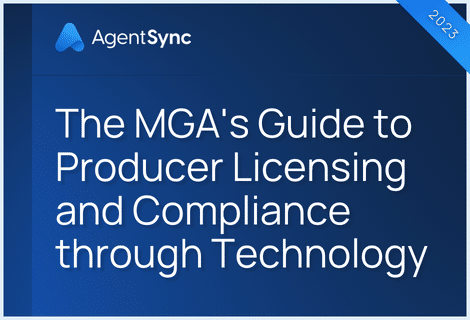

Exposing the myth of “front-end” compliance for insurance carriers and MGAs
Keeping up with insurance laws and regulations and ensuring full compliance with them is a challenge for every member of the insurance distribution channel. Of all the hot-button issues in the insurance compliance world, producer licensing is near the top.
Obviously, insurance agencies must keep their licensed producers actually licensed and in compliance with all laws that govern all lines of authority in all states they sell in. However, that doesn’t mean insurance carriers and MGAs are free of the obligation to monitor and verify producer licensing and compliance.
On the contrary, insurance carriers and MGAs are held to a high standard when it comes to their role in insurance producer licensing and compliance. The MGA Act spells this out, and each state has their own version of MGA Act, including state-specific obligations. Generally, though, the MGA Act says MGAs and MGUs are duty-bound to ensure their downstream producers have licenses in good standing. And the fines for ignoring or neglecting these duties can be steep.
Take Delaware, for example. Even as the second-smallest state in the U.S., the Delaware Department of Insurance issued $700,000 in penalties for non-compliance in 2019 alone. This number was actually down from $950,000 in 2018.
While some companies act with willful negligence (see: Zenefits fined $7 million by State of California) Delaware’s Deputy Insurance Commissioner Tanisha Merced points out that many companies facing fines for compliance issues don’t actually realize they’ve done anything wrong! As any traffic cop will tell you though, ignorance of the law is no excuse.
Many insurance carriers and MGAs hover somewhere in between: They often don’t break laws intentionally, but instead assume they’re protected because someone else is responsible for insurance producer licensing and compliance. One of the most common mistakes a carrier or MGA makes is closely tracking only the license status of an overall agency, instead of tracking every sub-agent selling its products.
Carriers and MGAs often rationalize away their responsibilities by having agencies sign producer agreements they believe shield them from liability, making it unnecessary for them to verify the license status of each agent or producer selling their products.
The truth is, these agreements don’t prevent insurance carriers and MGAs from facing penalties if a regulator discovers one of their appointed producers is operating without a valid insurance license.
Some carriers or MGAs may feel their agreements are rock solid, thinking there’s no way they could be legally liable for any sub-agents selling their products without valid licenses. Even if this were the case, carriers and MGAs would still do well to consider the time and monetary costs of proving it, as well as giving some thought to the negative publicity that could result if their name were to be brought into a lawsuit or make headlines.
The importance of fullstack compliance in insurance
The idea of fullstack compliance is one that comes from the technology world. “Fullstack” refers to an integrated approach, combining front end and back end, upstream and downstream. When it comes to insurance, fullstack compliance is the idea of maintaining compliance from all angles.
It’s not uncommon for an insurance carrier or MGA to monitor the compliance of their distribution channel partners’ licenses at the beginning of their relationship, or perhaps annually. Or, maybe a carrier will keep close tabs on the compliance of any MGA it works with, while trusting the MGAs to make sure its agencies are buttoned up. In these scenarios, none of the entities are practicing fullstack compliance. This leaves plenty of risk exposure for all of them.
If a carrier or MGA is only concerned with front-end compliance, there is a risk that a producer with an expired license could write a policy they are legally not permitted to write. While the carriers and MGA may believe they’re protected against mistakes or intentional acts by the sub-agents of the agencies they work with, this is not necessarily true.
It’s only when each member of the distribution channel practices fullstack compliance that everyone, both upstream and downstream, can be assured of ongoing compliance with all applicable insurance laws and regulations. Fullstack compliance means knowing in real-time that each and every producer selling a product for an agency – and each and every MGA acting on behalf of an insurance carrier – is fully authorized to do so.
Until now, in today’s world of instant communication, the process for verifying insurance producer licensing has still been relatively slow. It involves submitting requests and faxing or emailing paperwork in order to verify the status of a license. For most businesses, it is also a one-time process, which has to be repeated state by state. Imagine how real-time, two-way communication would change the game for everyone involved in verifying a producer’s license status.
It’s time to end the era of front-end and one-time compliance checks
Insurance carriers and MGAs no longer have to imagine a day in which real-time producer licensing updates are accessible and at your fingertips: that day is today.
With the entire insurance industry facing increased mergers and acquisitions, a higher volume of producer onboarding, and a new generation of insurance producers on the horizon, the old way of managing producer licensing compliance will no longer work. Today’s producer workforce is giving way to tomorrow’s new breed of high-tech insurance agents who expect their side of the industry to be as tech-savvy as they are.
Meanwhile, state and federal regulators are more concerned about protecting consumers than ever before. State departments of insurance are cracking down on enforcement and the fines, penalties, and restitution for non-compliance exceeded $42 million in 2019 in the United States. That’s $42 million reasons why insurance carriers and MGAs need to embrace fullstack compliance now.
To get started on leveling up your compliance, check out AgentSync Manage today.

